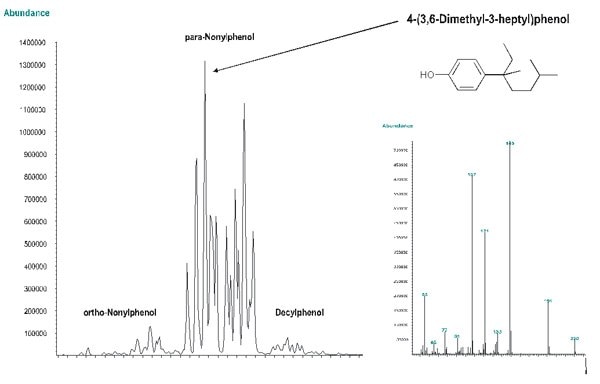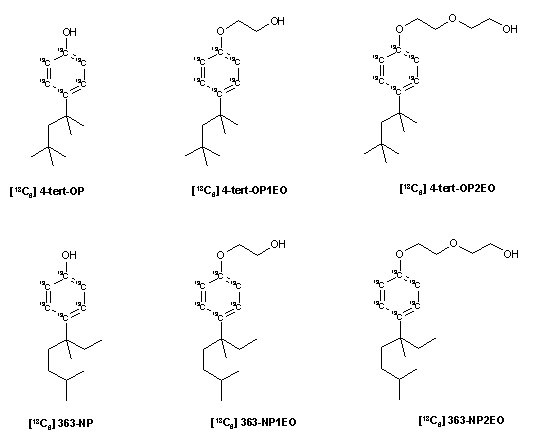Standards for ISO 18857-2
Analysis of alkylphenols and alkylphenol ethoxylates using new 13C-labeled and deuterated internal standards according to ISO 18857-2
Alkylphenols are starting materials for the synthesis of alkylphenol ethoxylates, which are commonly used as non ionic tensides, dispersive agents in paper and leather manufacturing, emulsifiers for pesticide formulations and as auxiliary agents for drilling and flotation. The most important members are ethoxylates of nonylphenol (NP) and octylphenol (OP). The number of ethoxylate units can be as high as 100. Alkylphenol ethoxylates are produced in huge quantities; the annual worldwide usage is estimated to be around 600,000 tons [1].
As a consequence of the wide-spread use for more than forty years, alkylphenols and alkylphenol ethoxylates have become ubiquitous environmental contaminants [2,3] and have even been found in foodstuffs [4]. The environmental consequences of this bioaccumulation are of serious concern: Alkylphenols exhibit estrogen-like activity and disrupt male fertility in fish and aquatic mammals [5]. The same mechanism operates for short-chain ethoxylates of OP and NP with one to two ethoxy units.
The environmental impact of OP and NP and their mono- and diethoxylates have prompted their inclusion in national and international legislation with corresponding monitoring programs.
For an efficient monitoring of these compounds in the environment and verification of the compliance with regulations, a reliable and rugged analytical method is crucial. However, the analysis of alkylphenols and their ethoxylates is challenging, primarily because of the lack of availability of labeled internal standards.
Actually, in Germany the ISO 18857-2 for the analysis of OP, NP and their mono- and diethoxylates, including bisphenol A, in surface water is going to be worked out. The method utilizes solid phase extraction (SPE) and quantification by GC-MS after derivatization with MSTFA.
Comprehensive studies, which included interlaboratory proficiency testings, proved the suitability of the internal standards listed in Figure 2 and resulted in precise and accurate measurements of the target analytes. As a result, all internal standards so listed were included in ISO 18857-2.
We are pleased to offer the complete range of labeled compounds listed in ISO 18857-2 for the analysis of OP, NP and their mono- and diethoxylates. The corresponding product numbers and concentrations are listed.
Labeled octyl- and nonylphenol and associated ethoxylates, solutions in acetone
Literature

Figure 1.GC-MS of technical grade nonylphenol and detailed mass spectrum of isomer 363-NP.
GC Conditions:
- instrument: HP 5890
- detector: MSD HP 5971
- column: 5% phenyl polymethylsiloxane , 25 m x 0.25 mm, 0.25 µM, (L x ID, FT)
- oven: 60 °C (1 min.), 10 °C/min. to 320 °C (10 min.)
- oven programme: injector temperature: 280 °C
- carrier gas: helium, 1 mL/min
- injection: 2.0 µL, splitless

Figure 2.Molecular structures of 13C-labeled octyl- and nonylphenol and associated ethoxylates.
To continue reading please sign in or create an account.
Don't Have An Account?